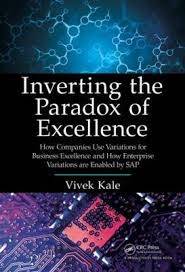Inverting the Paradox of Excellence : How Companies Use Variatio
Kale, Vivek
Éditeur : CRC PRESS
ISBN papier: 9781466592162
Code produit : 1078871
Catégorisation :
Livres /
Gestion /
Management /
Stratégie
Formats disponibles
| Format | Qté. disp. | Prix* | Commander |
|---|---|---|---|
| Livre papier | En rupture de stock** |
Prix membre : 67,40 $ Prix non-membre : 70,95 $ |
*Les prix sont en dollars canadien. Taxes et frais de livraison en sus.
**Ce produits est en rupture de stock mais sera expédié dès qu'ils sera disponible.
Description
Over time, overemphasis and adherence to the same "proven "routines that helped your organization achieve success can also lead to its decline resulting from organizational inertia, complacency, and inflexibility. Drawing lessons from one of the best models of success, the evolutionary model, Inverting the Paradox of Excellence explains why your organization must pro-actively seek out changes or variations on a continuous basis for ensuring excellence by testing out a continuum of opportunities and advantages. In other words, to maintain excellence, the company must be in a constant state of flux.
The book introduces the patterns and anti-patterns of excellence and includes detailed case studies based on different dimensions of variations, including shared values variations, structure variations, and staff variations. It presents these case studies through the prism of the "variations" idea to help you visualize the difference of the "case history" approach presented here. The case studies illustrate the different dimensions of business variations available to help your organization in its quest towards achieving and sustaining excellence. The book extends a set of variations inspired by the pioneering McKinsey 7S model, namely shared values, strategy, structure, stuff, style, staff, skills, systems, and sequence. It includes case history segments for Toyota, Acer, eBay, ABB, Cisco, Blackberry, Tata, Samsung, Volvo, Charles Schwab, McDonald's, Scania, Starbucks, Google, Disney, and NUMMI. It also includes detailed case histories of GE, IBM, and UPS.























